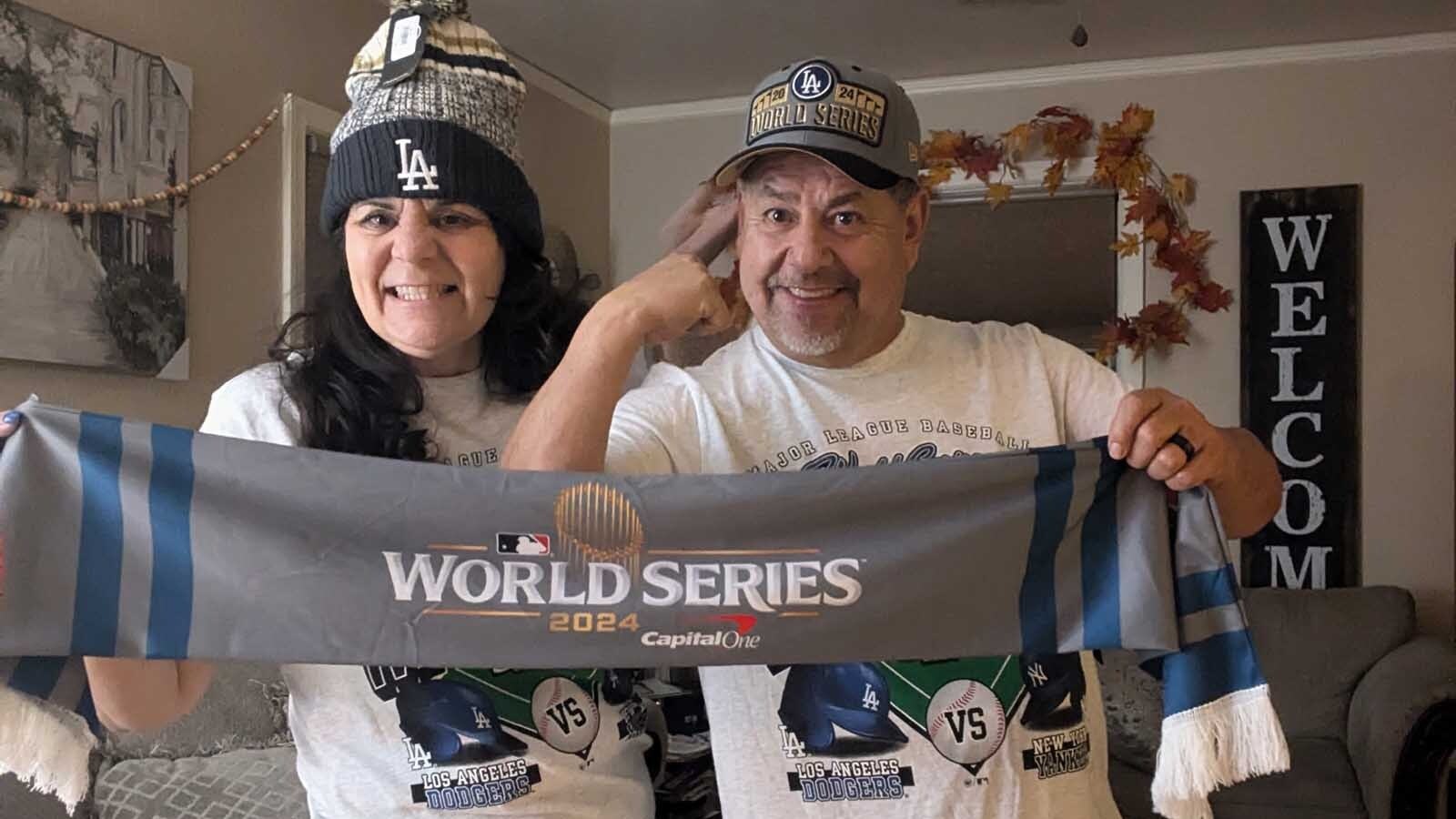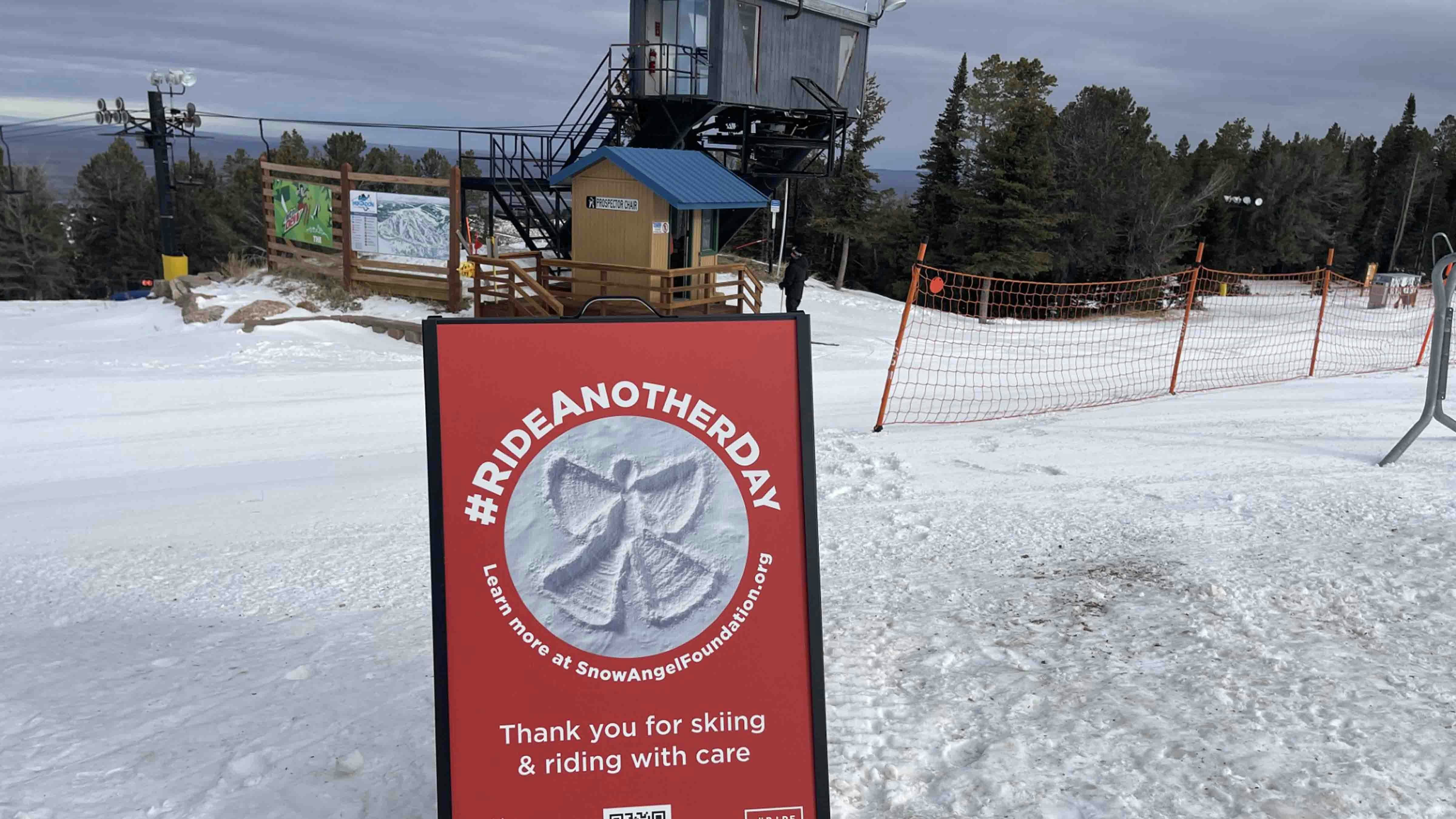Glen Chavez bought a 75-inch television this year with one purpose in mind: to watch his beloved Los Angeles Dodgers hopefully win the World Series from the comfort of his living room in high definition.
But after the excitement of the team’s 18-inning win over the Toronto Blue Jays on Monday night, Chavez decided that wasn’t enough, so he turned to his wife Annette with that telltale look on his face.
She knew exactly what he was thinking, and she nervously shook her head.
“I said to her, ‘Come on, girl! I just booked us a flight,’” Chavez said.
On an impulse, the Cheyenne couple jumped on a plane to Los Angeles and headed straight for Dodger Stadium after touching down.
It’s the latest example of an intensifying fanhood that’s starting to resemble an addiction, as the couple in recent years have chased after spectator experiences across the country like an outfielder running to get under a fly ball.
Even when it means throwing daily life to the wind. After all, he reasons, you only live … twice.
“I mean, we weren’t planning on this, but yesterday we hopped on a plane and now we're in LA. Who does that?” he said. "I’ll tell you: a guy with a second lease on life!”
The only downer for the Dodgers superfan is he went to all that effort and expense to watch the team he lives and dies for lose in the World Series — twice.

‘Who In The Hell Are You Now?’
Chavez works at Trujillo’s Barber Shop in Cheyenne, where he’s known by customers as the gregarious barber with a Husky dog named Dodger, and who insists the TV stay tuned to baseball, according to co-worker Marcus Gallizzi.
But he’s also becoming known as the barber with an impulsive streak.
“Couple weeks ago, we get this text from [Chavez] out of nowhere, and he says, ‘Hey, I’m in Philadelphia for the Dodgers game. I won’t be coming in. See you next week,'” Gallizzi said, explaining that in recent months Chavez’s spontaneity has reached new heights.
The new spontaneity stems from a fateful day in 2024 when Chavez, from nowhere, became instantly unwell while cutting hair.
“Suddenly I looked at one of my partners and just I said, 'I don't feel well. I'm going to go home and lay down,’” Chavez said. "Apparently, I talked to my wife and she told me to go to the ER, but I don't remember talking to her. What I remember is the cat.
“That cat wouldn’t let me rest. She kept pawing, meowing. I flung her off the bed twice, before finally she bit my arm, and it kind of woke me up and I realized: I need to go to the ER.”
He drove himself to the hospital, but has no memory of it.
His heart stopped beating in the emergency waiting room. By the time he woke up in a recovery bed, his heart had three stents, and he had a new calling.
“After that, there’s only a few things that matter to me: God, my family, camping, and this,” he said, alluding to the excitement at Dodger stadium. “Baseball is gospel for us right now.”
Once recovering from a serious cardiac arrest, he promptly turned into the kind of guy who’d drive straight through the night to make Dodger Stadium in time for the opening pitch against the New York Yankees; the kind of guy who’d fly to the East Coast to catch the games of the myriad professional teams in more than one professional sport.
And he’d do it all in the same weekend.
“There’s been times where my just wife looks at me and says, ‘Who in the hell are you now?’” he said.
Sandlot
Chavez grew up in Cheyenne, where as a youth he cut his baseball teeth on a diamond at Hebard Elementary School. Dozens of neighborhood kids gathered for pick-up baseball on weekends and throughout the summer.
“We’d have 30, 40 kids from the south side community. We’d play all day and then go wandering. It was kind of like ‘The Sandlot,'” he said, referring to the 1993 baseball film in which the American pastime converges with childhood shenanigans.
“Did we do some things we probably shouldn't have? Of course. Nothing to land us in jail,” he said. "Maybe there was a bit of vandalism, a broken window maybe, but we can call those things mishaps."
Although he was never interested in mishaps come Saturday, because that’s when Dodgers games aired on ABC’s Wide World of Sports.
“We play for a while and then I’d say, ‘Hey, you guys, I can't play anymore, I gotta go watch the Dodgers.' And they were always like, ‘Oh, come on, man, nobody cares about the freaking Dodgers,’” he said, adding that some things never change.
“The funny thing is, I still hear that,” Chavez said. "Everybody in the barbershop hates the Dodgers. All my co-workers want them to lose.”
With the Blue Jays now leading the series 3-2 after winning two straight in LA, the last few days have given his co-workers an opportunity to gloat.

‘If My Cardiologist Only Knew’
Dodger Stadium is home to one of the sport’s most diverse and loyal fanbases, and a World Series game there can get rowdy.
“The atmosphere is crazy, insane. It’s 55,000 screaming fans, diehard fans. Diehard Latinos, Asians, and every single ethnicity,” said Chavez, who describes the current roster as “a-once-in-a-lifetime, generational lineup.”
Though they didn’t exactly play like All-Stars on Chavez’s behalf. The team took back-to-back beatings at Dodger Stadium during his visit, which to him felt like a personal slight.
“I'm going to be honest with you,” he said. "I’m pissed. I'm mad. I don’t want to get into money, but we spent a pretty good price on those damn tickets, and then the Dodgers score one freaking run. Are you kidding me?
“If my cardiologist only knew what I was going through with my heart, and the stress of watching these guys go through 18 innings and then coming back the next day and only being able to score one run.”
His response was to temporarily boycott the stadium.
“My wife asked me, ‘Well, do you want to go to the games tonight?’” Chavez recounted. “And I said, 'No, I'm mad at them. We're going to Disneyland instead.' That’s what you do when the Dodgers get their butt kicked.”
Elsewhere fans have boycotted the team not for performance, but politics.
Fandom Deeper Than Politics
The Dodgers' fanbase is 40% Latino, and many of those fans were upset by a lack of support from the franchise in the face of what they say was racial harassment of citizens and non-citizen fans by the Trump administration, whose aggressive Immigration and Customs Enforcement (ICE) raids targeted the city’s Latino communities, according to reporting by the Los Angeles Times.
The Dodgers came under political fire from fans last season as well following their decision to include a controversial LGBTQ comedy-troupe called the Sisters of Perpetual Indulgence, who participated in Dodger-sponsored PRIDE celebration.
Chavez was among those offended.
“If you had asked me a year ago, I would have told you I was never going to come to this stadium again after those sisters came here, because they’re highly offensive and I just said, 'I'm done,'” Chavez said.
Yet there appears to be a deeper connection holding together Dodger fans and franchise, something anchored below the turmoil of politics or team performance.
It’s a quality Chavez experienced while touring the city, including notoriously rough areas like the Rampart District of East L.A.
It's in places like this where a unique quality of fraternity stands out and has helped reassure him that the Dodgers, good times and bad, will always be his team.
“Even in areas of the city that are gang infested and dangerous, I still have this one thing in common with them: my L.A. Dodgers hat,” he said. "It's like a badge of honor. When you walk the streets, you go to stores, restaurants, and you have this hat on, you feel safe.”

Coming To Bat For The Next Generation
Baseball has inspired a sense of community in his hometown too, where Chavez has organized to improve conditions for the next generation of Sandlot-like youth.
The Hebard diamond lay downwind of the HP Sinclair oil refinery, and for generations, Cheyenne’s youth played baseball amid the pall of its chemical emissions.
“Without a doubt, nobody can convince me otherwise, I know that so many families who lived in that neighborhood and had cancer, their leukemia came from that,” Chavez said. "[Emissions] were all we could breathe.”
It was the issue that led Chavez to join a community advisory panel, where he advocated first for air-quality monitoring and eventually helped nudge the refinery to convert operations to bio-diesel refining operations, which entail fewer harmful emissions.
In this way, his love of the sport has driven him to look after other baseball fans, even if their team isn’t the Dodgers. And even when his team plays poorly, he knows he’ll be back.
“I don't know if you know Spanish, but there was a lot of ‘puto’ calling in the stadium,” he said. "It’s not a very good word, but that's the main word from these fans right now."
He and the Dodgers have been through too much together for Chavez to consider trading in his loyalty now.
“I’ve always been a Dodgers fan since I was a kid,” he said. "I’m not a bandwagon guy.”
Zakary Sonntag can be reached at zakary@cowboystatedaily.com.






